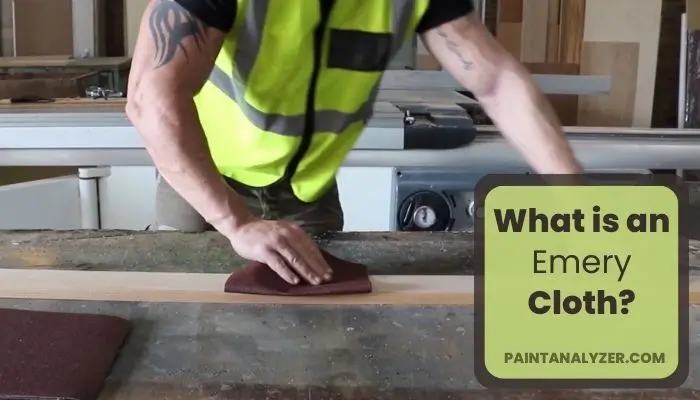Emery cloth is a type of abrasive cloth that is often used in metalworking. It is commonly used to remove rust, paint, and other debris from metal surfaces. Emery cloth can be made from a variety of materials, including aluminum oxide, silicon carbide, and zirconia alumina.
Emery cloth is most commonly used to remove rust from metal surfaces or to polish them to a high shine. It can also be used to sand down wood or plastic surfaces. When working with emery cloth, it’s important to use the correct grade for the material you’re working on and the desired finish.
The different grades of emery cloth are typically determined by the size of the abrasive particles that are used to make the cloth. A finer grade can be used for smaller areas or more delicate work.

What Are The Uses Of Emery Cloth?
Emery cloth is a type of sandpaper that is often used on wood or metal. It is made from emery, which is a natural abrasive. The cloth is usually backed with paper or cloth to make it more durable.
Emery cloth can be used to remove paint, rust, or other debris from surfaces. It is also used for polishing, grinding, and finishing metal surfaces. The cloth is composed of a range of different grit sizes, which allows it to be used for both rough and delicate work.
Emery cloth can be used by hand or with a power tool. When using emery cloth by hand, it is important to apply gentle pressure and move the fabric in a circular motion. When using an emery cloth with a power tool, always follow the manufacturer’s instructions.
Emery cloth is available in a variety of grades, with the finer grades being used for polishing and the coarser grades being used for cleaning and preparing surfaces. For best results, start with a coarse grit and then move to a finer grit.
What Are The Different Grades Of Emery Cloth?
The grade of emery cloth you use will depend on the project you’re working on. There are different grades of emery cloth available on the market, each designed for a specific purpose. The most common grades are 180, 220, 400, and 600.
Coarse emery cloth
180-grade emery cloth is the coarsest option and is typically used for heavy sanding and removing paint or varnish. The coarser the emery cloth, the more aggressive the sanding. This means that coarse emery cloth can remove more material quickly, but it can also damage the surface more easily.
Fine emery cloth
220-grade cloth is slightly finer and is often used for sanding wood. 400-grade emery cloth is ideal for finishing work and removing small imperfections. 600-grade cloth is the finest option and is typically used for polishing surfaces. Fine emery cloth is less likely to damage the surface, but it will take longer to remove the material.
Can Sandpaper Be An Alternative To Emery Cloth?
When it comes to sanding wood, there are two main types of abrasives that are used: emery cloth and sandpaper. Both have their pros and cons that should be considered before deciding which one to use.
Emery cloth
Emery cloth is a type of abrasive that is made from natural materials, such as emery ore. It is typically coarser than sandpaper and is best suited for removing paint or varnish from wood. However, because it is a natural material, it can be difficult to find in stores and may not be available in all grits.
Sandpaper
Sandpaper, on the other hand, is made from synthetic materials and is available in a wide range of grits. It is also typically much finer than emery cloth, making it ideal for smoothing wood surfaces. The downside to sandpaper is that it can be quite messy to work with and can clog up your sanding machine if not used properly.
Are Crocus Cloth And Emery Cloth The Same?
Crocus cloth is a type of abrasive cloth that is often used for polishing metal surfaces. Emery cloth is another type of abrasive cloth that is typically used for sanding down wood surfaces. Both crocus cloth and emery cloth are effective at removing debris and polishing surfaces, but they are best used for different purposes.
Crocus cloth
Crocus cloth is made from impregnated muslin fabric and is used for the final finishing and polishing of metals. It is often used on soft metals such as gold, silver, and brass. This type of cloth will give the metal a high-gloss finish.
Emery cloth
Emery cloth is made from impregnated fabric with abrasive particles and is used for rough finishing and polishing of metals. It is often used on hard metals such as steel and iron.
What Is The Grit Of Medium Emery Cloth?
Grit is a term used to describe the coarseness of a material. The higher the grit number, the finer the material. Emery cloth is a type of sandpaper that is commonly used for metalworking. The grit number of emery cloth ranges from 24 to 150.
Medium emery cloth has a grit of 60-80. It is a versatile grit that can be used for a variety of tasks, such as removing rust and preparing surfaces for painting and polishing. This grit is also great for removing paint or varnish from surfaces.
Can I Use Emery Cloth to Sand Wood Before Applying Concrete Primer?
Yes, you can use emery cloth on wood before applying concrete primer. Make sure to sand the wood surface gently with the emery cloth to create a smooth, even surface for the concrete primer. This will help the primer adhere better to the wood and ensure a more professional finish.
Emery Paper – How To Use It?
Can I Use Emery Cloth to Prepare a Surface Before Using Lacquer Thinner?
Yes, you can use emery cloth to prepare a surface before using lacquer thinner. Emery cloth is effective for removing old paint and smoothing rough surfaces, making it an ideal choice for prepping surfaces before the use of lacquer thinner.
Conclusion
No matter what kind of project you’re working on, whether it’s a simple repair job or something more complex, you want to have the right tools for the job. When it comes to sanding surfaces smoothly, emery cloth is a great option.
Emery cloth is available in various grits, from coarse to fine, so you can choose the right one for your needs. It is flexible and conforms well to irregular surfaces. It cuts quickly and leaves a smooth finish. If you need to remove rust or paint from metal surfaces, an emery cloth is a good choice. It can also be used to prepare wood surfaces for staining or painting.
Just be sure to use a finer grit emery cloth if you’re working with delicate surfaces like wood veneer or glass so you don’t damage them. Whether you’re a do-it-yourselfer or a professional tradesperson, emery cloth is a useful tool to have on hand for all kinds of projects.
